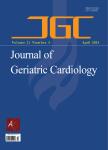Heart rate variability: a new tool to predict complications in adult cardiac surgery
Heart rate variability: a new tool to predict complications in adult cardiac surgery作者机构:Department of Cardiovascular Surgery Universitgt Campus Bio-Medico di Roma Rome Italy Department of Cardiac Surgery Golden Jubilee National Hospital Glasgow UK Department of Cardiac Surgery Centre Cardiologique du Nord de Saint-Denis Paris France
出 版 物:《Journal of Geriatric Cardiology》 (老年心脏病学杂志(英文版))
年 卷 期:2017年第14卷第11期
页 面:662-668页
核心收录:
学科分类:090603[农学-临床兽医学] 0821[工学-纺织科学与工程] 08[工学] 09[农学] 0906[农学-兽医学] 082103[工学-纺织化学与染整工程]
主 题:Cardiac surgery Complications Heart rate variability Predictive values
摘 要:Heart rate variability (HRV) refers to the variations between consecutive heartbeats, which depend on the continuous modulation of the sympathetic and parasympathetic branches of the autonomic nervous system. HRV has been shown to be effective as a predictor of risk after myocardial infarction and an early warning sign of diabetic neuropathy, and in the cardiology setting is now recognized to be a useful tool for risk-stratification after hospital admission and after discharge. Recent evidences suggest that HRV analysis might predict complications even in patients undergoing cardiac surgery, and the present review summarizes the importance of HRV analysis in adult cardiac surgery and the perspectives for HRV use in current clinical practice. Although future larger studies are warranted before HRV can be included into daily clinical practice in adult cardiac surgery, HRV is a novel tool which might detect autonomic instability in the early postoperative phase and during hospital stay, thus predicting or prompt-diagnosing many of the post-operative complications.



